Noticia
Evento se organiza con apoyo de OEI, Unesco-Perú y Unicef-Perú
Fuente:http://www.andina.com.pe/agencia/noticia-minedu-realiza-seminario-internacional-sobre-jornada-escolar-completa-618868.aspx
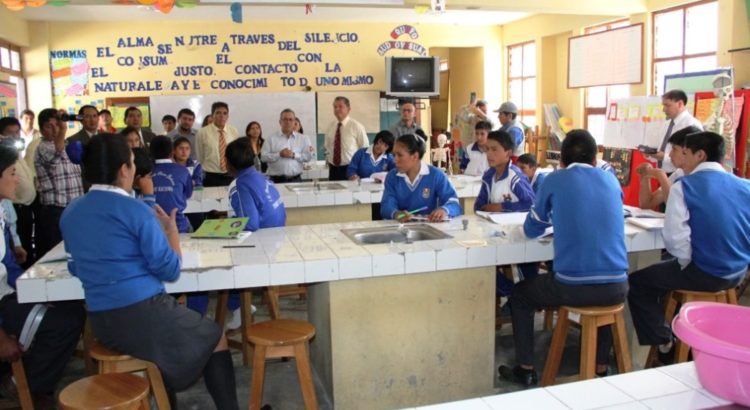
Noticia
Fuente:http://www.andina.com.pe/agencia/noticia-minedu-realiza-seminario-internacional-sobre-jornada-escolar-completa-618868.aspx
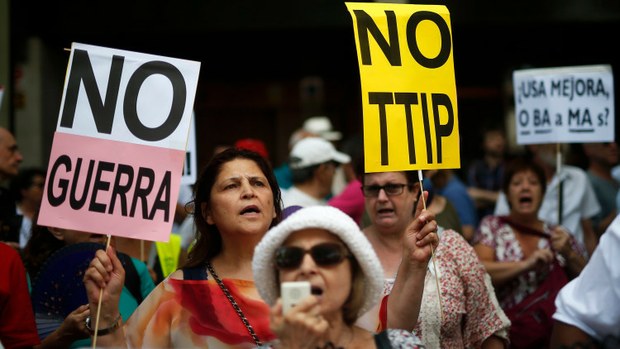
Europa/España/Julio del 2016/Noticias/http://www.vtv.gob.ve/
El colectivo Marchas de la Dignidad organizó una concentración frente a la embajada de EEUU en Madrid / Pidieron la retirada de las bases militares OTAN en España y expresaron su desacuerdo con políticas neoliberales
Fuente: http://www.vtv.gob.ve/articulos/2016/07/10/espanoles-protestaron-en-las-calles-de-madrid-repudiamos-la-visita-de-obama…obama-go-home-213.html
Fuente imagen: http://www.vtv.gob.ve/articulos/2016/07/10/espanoles-protestaron-en-las-calles-de-madrid-repudiamos-la-visita-de-obama…obama-go-home-213.html/reuters-espanoles.jpg/@@images/87207470-3ade-498a-9e5b-6cbf8fe6758d.jpeg
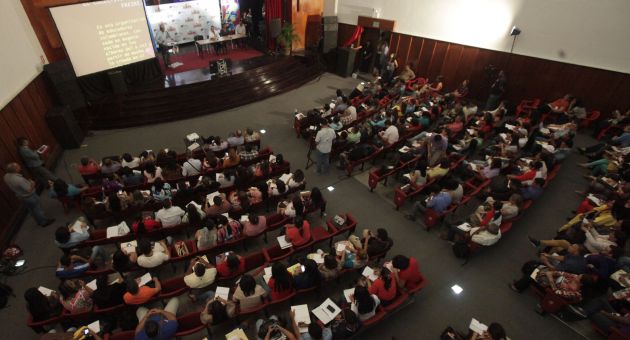
www.ciudadccs.info/11-07-2016/
Entre el 12 y el 14 de julio, el liceo Fermín Toro, ubicado al oeste de Caracas, será sede del III Congreso Pedagógico Nacional, el cual espera reunir a 800 maestros de las 24 entidades del país para debatir acerca de los avances y retos de la actividad educativa en Venezuela.
Este encuentro forma parte de las iniciativas del Sistema Nacional de Investigación y Formación del Magisterio Venezolano, y tiene el objetivo de reunir al gremio docente para profundizar en la caracterización de las escuelas y su entorno, así como establecer metas para el año escolar 2016-2017, refiere nota de prensa del Ministerio de Educación.
Asistirán docentes de los Simoncitos, escuelas, liceos y escuelas técnicas, que tendrán oportunidad de revisar inquietudes y plantear propuestas en cuanto a la formación permanente de los docentes, el despliegue del Sistema de Alimentación Escolar y la construcción de nuevos espacios educativos. De igual forma, reivindicar los logros de la masificación escolar y tecnológica impulsados por el Gobierno a través de programas como el Plan Canaima Educativo.
En el conocido liceo se instalarán varios paneles con mesas de trabajo lideradas por viceministros, autores de la Colección Bicentenario y docentes investigadores. A la vez, se realizarán talleres formativos y exposiciones de carteleras, informa el boletín.
En semanas anteriores se desarrollaron los Congresos Pedagógicos Municipales, en los que se debatieron propuestas que se llevarán al encuentro nacional.
A propósito del evento, José Guariguata, director de Formación de Personal Docente del Ministerio, recordó que en 2014, en medio de la desestabilización política, se hizo la Consulta Nacional por la Calidad Educativa, cuyas evaluaciones también deben ser abordadas en esta ocasión.
“Fue una Consulta incorporada a los más diversos sectores sociales, a distintas opiniones políticas, a educadores, estudiantes y familias, logrando reunir a más de siete millones de venezolanos, la cual tuvo como resultado la sistematización de diez banderas que, desde entonces constituyen la orientación fundamental de la gestión educativa del Gobierno Bolivariano, junto a la Constitución, la Ley Orgánica de Educación y el Plan de la Patria”, dijo, citado en el boletín.

http://m.ivoox.com/alerta-educativa-178-conflicto-estudiantil-las-audios-mp3_rf_12180536_1.html#
Descripción:
En Chile las reformas neoliberales en la educación superior han permitido el mayor negocio y privatización del sector en la historia. Durante la década del `90, los gobiernos de la concertación permitieron la expansión de universidades, …Ver mas
Por: Radio JGM
Categoría: Actualidad y Sociedad
Subcategoría: Política, economía y opinión
Fuente:http://m.ivoox.com/alerta-educativa-178-conflicto-estudiantil-las-audios-mp3_rf_12180536_1.html#
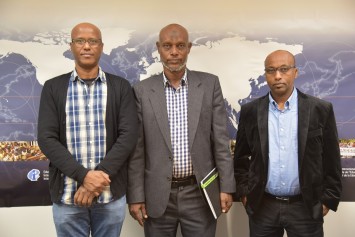
Internacional de la educación
El apoyo de la Internacional de la Educación a los compañeros de Yibuti que luchan por una educación de calidad y por el respeto de los derechos sindicales y humanos fue recientemente puesto de manifiesto cuando el activista de la educación yibutiano, Omar Ali Ewado, visitó la sede de la federación global.
Perseguido
Ewado había sido perseguido por los tribunales a raíz de la publicación de una lista de víctimas que desaparecieron en Yibuti tras la masacre encabezada por las fuerzas de seguridad, el 21 de diciembre de 2015. Detenido el 29 de diciembre de ese año, y transferido dos días más tarde a la prisión central de Gabode, fue liberado de la cárcel el 14 de febrero mediante una sentencia del tribunal de apelación, que desestimó todos los cargos interpuestos en su contra.
Durante su visita a la IE, Ewado explicó que los docentes de Yibuti seguían estando sometidos al acoso, al despido o a la reclusión.
Cuando los docentes son detenidos por llevar a cabo actividades sindicales o iniciativas que se oponen a las políticas del Gobierno, su ausencia se considera una “ausencia laboral injustificada” y se les deduce del salario, señaló Ewado.
El respaldo de la IE
La Internacional de la Educación prevé organizar un seminario sobre la educación de calidad a lo largo de 2016, con el fin de prestar apoyo a sus afiliados yibutianos, y de permitirles adquirir las competencias profesionales necesarias para ayudar a los docentes a mejorar la calidad de la educación.
Por otro lado, la Internacional de la Educación sigue vigilando atentamente la situación de los derechos sindicales y humanos de los docentes en Yibuti.
*Información de la imagen: Omar Ali Ewado (en el centro).

www.ecoportal.com/Por: Mauricio Rabuffetti
De los niños se dice que son como «esponjas» a la hora de absorber conocimiento, y en un mundo que enfrenta el cambio climático, aprender a cuidar el medio ambiente es fundamental, y así lo demuestra la primera escuela pública sustentable de América Latina, construida en Uruguay.
temperatura exterior es de 7.5 grados centígrados, en una mañana de invierno, de cielo plomizo sobre la localidad de Jaureguiberry, 85 kilómetros al este de Montevideo. Sin embargo, dentro de la escuela294, la temperatura alcanza casi 20 grados.
No hay aire acondicionado para combatir el crudo invierno ni el calor del verano. La escuela no está conectada a la red eléctrica ni a tuberías de agua. Su presencia se distingue por su arquitectura peculiar. Sin embargo, su construcción asegura que el rastro que dejará en la Tierra será leve: está pensada para que ningún residuo se arroje al entorno.
«Estamos bien. Tenemos más de 50% de carga. Tenemos solo energía solar», explica a la AFP la maestra y directora Alicia Alvarez, de 51 años. «Les explico lo que yo sé», aclara mientras muestra el sistema de condensadores que almacena la energía para el edificio. «Apago un poco la luz para no gastar», añade mientras estira automáticamente la mano hacia una llave.
Los paneles solares se observan a simple vista en el techo del recinto, diseñado por el famoso arquitecto estadounidense Michael Reynolds, conocido como «el guerrero de la basura» por sus construcciones que sacan residuos del medio ambiente, tales como ruedas de autos, latas y botellas, incorporándolos a sus obras.
La escuela, que contó con el visto bueno de las autoridades de la educación, pudo hacerse también gracias a financiamiento privado y al esfuerzo de una ONG. Comenzó a funcionar en marzo pasado.
Tiene 39 alumnos. Algunos niños son muy pequeños y otros están terminando su educación primaria. Todos tienen algo en común y lo saben: su escuela es especial y única, como su relación con el medio ambiente.
Saben que tirar basura está mal y aprendieron que con los residuos orgánicos pueden hacer compost, un fertilizante natural que utilizan para la huerta que crece, verde intenso, en un cantero delante de los tres salones de clase.
Plantas de albahaca, tomates, frutillas y acelgas, berenjenas o brócolis, y también un banano poco adaptado al frío invernal, se desarrollan gracias a la temperatura controlada y el riego permanente.
En el techo, el agua de lluvia se recoge mediante canaletas que van hacia un sistema de filtrado. De allí a los baños, a la huerta, para terminar, el sobrante, en un humedal donde todo se descompone con impacto mínimo sobre el entorno.
Aquí nada se desperdicia.

«Es una escuela llena de vida», resume Paula, que tiene siete años y con sus compañeros elabora una lista de cosas a hacer -y a evitar- para cuidar el planeta.
Esta mañana, en la clase de la maestra Rita Montans, de 45 años, trabajan en escritura espontánea y organización de conceptos. El tema disparador: ¿cómo cuidar el medio ambiente?
Los niños proponen y anotan ideas en sus cuadernos: «Cuidar las plantas»; «No tirar basura»; «No tirar las botellas«; «Las plantas nos ayudan a que podamos respirar aire más puro». «Si no hubiera árboles, no estaríamos más», dice contundente Sebastián, también de siete años.
El objetivo final, explica la maestra Rita, es crear una suerte de código de conducta para cuidar el entorno, y una «cruz ambiental» o «cruz verde» que podrían llevar los alumnos, tal como la «Cruz roja» que todavía existe en algunas escuelas del continente.
Los maestros siguen una capacitación especial para dar clases en la escuela sustentable, tanto a nivel de adaptación de programas de cursos, como para un manejo más autónomo del edificio.
Construido a partir de neumáticos rellenos de arena, latas usadas y botellas, el todo unido por hormigón, con grandes estructuras de madera y troncos de eucaliptus para sostener un techo verde y el peso de la tierra utilizada como aislante, el inmueble tiene una forma particular. Es luminoso y tiene espacios bien distribuidos. Nada parece estar apretado.
Una vez por semana, los niños tienen una hora de clase de huerta y cosechan frutas y legumbres que ellos mismos cultivan, y que se incorporan a las ensaladas servidas en el comedor.
Sebastián dice que cosechó tomates cherry. «‘Tan buenos», afirma Felipe, de ocho años. En cambio, las berenjenas no se pueden cosechar aún. «Todavía no podemos comer porque no están ‘hechas», explica Patricia, de siete años, con gesto de resignación.
Algún rayo de sol se cuela entre las nubes. Un bus turístico se detiene delante de la escuela y decenas de personas sacan fotografías desde las ventanas del vehículo.
No cabe duda de que aunque su marca ambiental será mínima, la escuela sustentable dejará un rastro indeleble entre los niños que allí estudien.
Es que «no hay mejor aprendizaje que vivirlo», dice convencida la maestra Alicia. «Más allá de que (los niños) puedan aplicar o no» lo que aprendan «la semilla está plantada», concluye confiada.
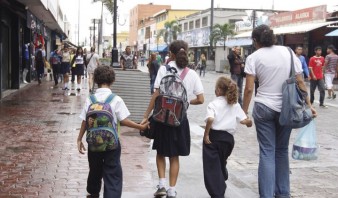
www.eltiempo.com.ve/11-07-2016/Por: Grisnel Guevara
Con el aumento de 100% para el próximo año escolar, padres y representantes contemplan la posibilidad de cambiar a sus hijos a instituciones públicas.
Si en el actual período escolar (2015-2016) los padres y representantes ya se las han visto “negras” para mantener al día la mensualidad en el colegio de sus hijos, para el lapso 2016-2017 la situación se tornará el doble de difícil con el nuevo aumento académico. El pasado 12 de junio se conoció que las instituciones privadas aumentarán 100% el costo de sus matrículas, sin contar con los futuros incrementos salariales que afectarán directamente las cuotas escolares.
Padres y madres de la zona norte de Anzoátegui manifestaron su preocupación al respecto.
Francisco Gutiérrez, comerciante independiente y representante de dos niños en la Unidad Educativa Nuestra Señora de Lourdes II, ubicada en el sector Pascal de Puerto La Cruz, indicó que mensualmente paga Bs 16 mil por sus dos hijos, y que para el próximo año tendrá que empezar a cancelar 25 mil por cada uno.
“Estamos considerando cambiar a los muchachos a un (colegio) público. Soy el único que trabaja de la familia, porque lamentablemente mi esposa se quedó desempleada hace tres meses y tengo que correr con todos los gastos de la casa”, señaló Gutiérrez.
En una situación similar se encuentra Marjorie Lárez, quien desde hace cuatro meses está sin trabajo.
Lárez, madre de dos niñas, la mayor de 5 años y la menor de 2, explicó que su esposo es quien cubre los gastos familiares, por lo que decidieron inscribir a la de 5 años en una institución pública, ya que en la privada incrementaron la mensualidad de Bs 2.270 a 8. “No podemos pagar eso teniendo también los gastos de la vivienda”, dijo Lárez.
Reciclar para economizar
“Soy madre de dos niños. Uno estudia en un colegio privado en el que pagamos Bs 7.000 y al otro lo tenemos en uno público. A partir de este año trataremos de ahorrar dinero al vestir al hermano menor con los uniformes del mayor. Lamentablemente no se puede hacer lo mismo con los zapatos porque están todos roticos y los más baratos cuestan Bs 15 mil”, explicó Mireya Lozada, empleada en un salón de belleza.
Por otro lado, Marlin Vizcaíno opinó que los nuevos ajustes están «demasiado elevados» para sus ingresos.
«Tengo a mi hijo en tercer grado. Hasta febrero pague Bs 2.500 mensuales, en marzo aumentaron la matrícula a Bs 5.000 y ahora en julio me dijeron que tengo que pagar 8 mil bolívares», dijo.
La señora, quien trabaja vendiendo chucherías frente al Centro Comercial Regina, en Puerto La Cruz, indicó que para el próximo período académico seguirá vistiendo a su hijo con el mismo uniforme que ha venido usando durante el año escolar actual, para «tratar de economizar».